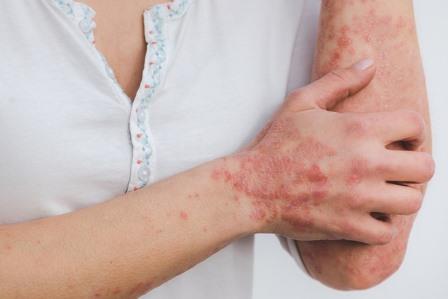Living with Psoriasis
Table of Contents

Psoriasis is a chronic autoimmune condition that affects the skin, causing it to become red, itchy, and scaly. This condition can impact a person’s physical, emotional, and social well-being. Living with psoriasis can be challenging, but with proper care and management, it is possible to lead a healthy life.
Physical Effects:
The physical effects of psoriasis can vary from person to person. Some people may experience mild symptoms, while others may have severe symptoms that cover large areas of their body. Psoriasis can cause discomfort, pain, and itchiness, which can affect a person’s ability to carry out daily activities.
Psoriasis can also affect a person’s nails, causing them to become thick, discolored, and pitted. In severe cases, psoriasis can cause joint pain and inflammation, a condition known as psoriatic arthritis.
Emotional Effects:
The emotional effects of psoriasis can be significant. People with psoriasis may feel self-conscious, embarrassed, and anxious about their appearance. This can lead to social isolation and a reduced quality of life.
Living with psoriasis can also be stressful, which can trigger flare-ups and exacerbate symptoms. People with psoriasis may experience feelings of depression, anxiety, and low self-esteem.
Social Effects:
The social effects of psoriasis can be challenging. People with psoriasis may feel uncomfortable being in social situations, such as going to the beach or swimming pool, because of their visible symptoms.
Psoriasis can also affect a person’s career. Some jobs, such as those that require contact with the public, may be difficult for people with visible psoriasis symptoms.
Managing Psoriasis:
While there is currently no cure for psoriasis, there are many treatment options available to manage symptoms. These treatments can include:
- Topical Treatments: These are creams, ointments, and lotions that are applied directly to the skin. They can help to reduce inflammation, itching, and scaling.
- Phototherapy: Phototherapy involves exposing the skin to controlled amounts of UV light. This can help to reduce inflammation and slow the growth of skin cells.
- Systemic Medications: These are medications that are taken orally or by injection. They work by suppressing the immune system to reduce inflammation.
- Lifestyle Changes: Making healthy lifestyle choices, such as eating a healthy diet, managing stress, and getting enough sleep, can help to reduce psoriasis symptoms.
Living with psoriasis can be challenging, but with proper care and management, it is possible to control symptoms and lead a healthy life. It is important to work closely with your doctor to find the best treatment plan for you and to make healthy lifestyle choices to manage your psoriasis symptoms.
Skin Care Tips:
- Moisturize: One of the most important things you can do to manage psoriasis is to keep your skin moisturized. This helps to reduce itching, redness, and scaling. Use a good quality moisturizer that is free of fragrances and other irritants, as these can exacerbate psoriasis symptoms.
- Avoid Triggers: Certain triggers can worsen psoriasis symptoms. These can include stress, smoking, alcohol consumption, and exposure to cold weather. Identify your triggers and try to avoid them as much as possible.
- Sun Protection: Exposure to the sun can also trigger psoriasis symptoms. Protect your skin from the sun by wearing protective clothing, such as long-sleeved shirts and hats, and using a broad-spectrum sunscreen with an SPF of at least 30.
- Bathing: Taking regular baths can help to remove scales and soothe the skin. Use warm (not hot) water and add oatmeal, Epsom salts, or colloidal oatmeal to the bath to soothe the skin.
- Avoid Scratching: Scratching can worsen psoriasis symptoms and lead to skin infections. If you feel the urge to scratch, try using a cold compress or a moisturizer to relieve itching.
Treatments:
- Topical Treatments: Topical treatments are the first line of defense for managing psoriasis symptoms. These include creams, ointments, and lotions that contain corticosteroids, vitamin D analogs, and retinoids. They work by reducing inflammation, scaling, and redness.
- Phototherapy: Phototherapy involves exposing the skin to ultraviolet (UV) light under controlled conditions. This can be done at home using a UV lamp or in a doctor’s office. It can be an effective treatment for psoriasis that is resistant to topical treatments.
- Systemic Treatments: Systemic treatments are medications that are taken orally or by injection. They are reserved for more severe cases of psoriasis and can include methotrexate, cyclosporine, and biologics. These medications work by suppressing the immune system to reduce inflammation.
- Alternative Treatments: Some people with psoriasis find relief from alternative treatments, such as acupuncture, yoga, and meditation. While there is little scientific evidence to support these treatments, they may be worth trying if other treatments have not been effective.
Living with psoriasis can be challenging, but with proper care and management, it is possible to control the symptoms and lead a healthy life. It is important to work closely with your doctor to find the best treatment plan for you and to make healthy lifestyle choices to manage your psoriasis symptoms.
